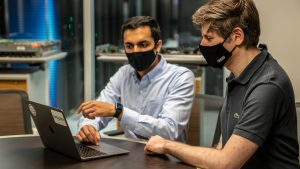Chain Reaction Innovations Cohort 4 startup Super.tech releases first product aimed at enabling the adoption of quantum computing years sooner than otherwise possible
There’s a lot of hype around quantum. The technology is still very new yet there is enormous potential for quantum to address many computational problems that even the most powerful computing tools cannot solve.
One such computational problem—of pressing relevance due to climate change—is the development of new fertilizers to reduce greenhouse gas (GHG) emissions associated with agricultural production. In 2010, fertilizer production and use was estimated to produce as much as 11 percent of the global anthropogenic GHG emissions. Even the most powerful conventional computers are incapable of modeling the quantum mechanics underlying these complex molecules, like for fertilizer. Quantum computers can address these classes of problems. More generally, quantum computers can reduce the energy needed and GHG emission associated with several industries including finance, logistics, cybersecurity, and manufacturing.
Quantum Obstacles
The big obstacle is that quantum hardware is still in its infancy. Unless there is a complete re-think of how software is developed and integrated with the hardware (the system stack), it will take years, perhaps decades, to realize the potential benefits of quantum.
How to solve huge computational problems with small, noisy quantum computers? This perfect moment—where science-based innovations emerge from US investment in basic research—can be a game-changer. Enter Pranav Gokhale and Super.tech.
Impact
With their announcement of SuperstaQ, Super.tech aims to shorten the time it takes to enable the quantum era by five years. It’s hard to over-emphasize the potential—a five-year acceleration to real impact will entice massive investments from the private sector to realize deployment of quantum computing platforms into the real world. It would also enable climate impact within the next decade, which is vital to meet US goals of net-zero emissions by 2050.
“Developing quantum software for the future requires today’s highest performance computers and simulators—which is one of many resources that makes Argonne stand out.”–Pranav Gokhale, Super.tech Co-founder & CEO
Moving an innovation like Super.tech’s isn’t easy and getting products to market, even digital ones, can take years. The Chain Reaction Innovations (CRI) program, founded by The U.S. Department of Energy’s Advanced Manufacturing Office and Argonne National Laboratory, was set up in 2016 specifically to address key barriers that hinder this process.
As part of CRI’s Cohort 4, through an entrepreneurial fellowship, Pranav has been paid to work full-time to develop SuperstaQ for the past fourteen months. Overall CRI provides its innovators with about $720,000 in non-dilutable support during their two-year incubation at Argonne.

In the CRI program Super.tech leveraged the vast resources of Argonne National Laboratory to help develop the first full-stack, hardware-agnostic software platform. Working with Argonne scientist Martin Suchara, Pranav and his team have been leveraging the Argonne Leadership Computing Facility, which has a quantum simulator vital to the development of SuperstaQ. In fact, Suchara is currently using SuperstaQ to perform pulse-level optimizations of quantum hardware. The cost and time savings realized by the CRI model effectively shortened the time to get SuperstaQ deployed by at least 2-4 years.
“Argonne’s CRI program has enabled Super.tech to collaborate with world experts in quantum sciences,” said Super.tech‘s Co-founder and CEO Pranav Gokhale. “Developing quantum software for the future requires today’s highest performance computers and simulators—which is one of many resources that makes Argonne stand out.”
What’s Next
Pranav still has a year left in the CRI program to further develop his technology, where Super.tech will now work with a number of industrial partners and Argonne to demonstrate the potential of SuperstaQ with tangible examples.
Super.tech was also recently selected to be part of Duality’s founding Cohort of quantum startups. Founded by a unique public-private partnership consisting of Polsky Center for Entrepreneurship, the Chicago Quantum Exchange, the University of Illinois, P33, and Argonne, Duality is the first startup accelerator in the world dedicated to supporting quantum startups.

